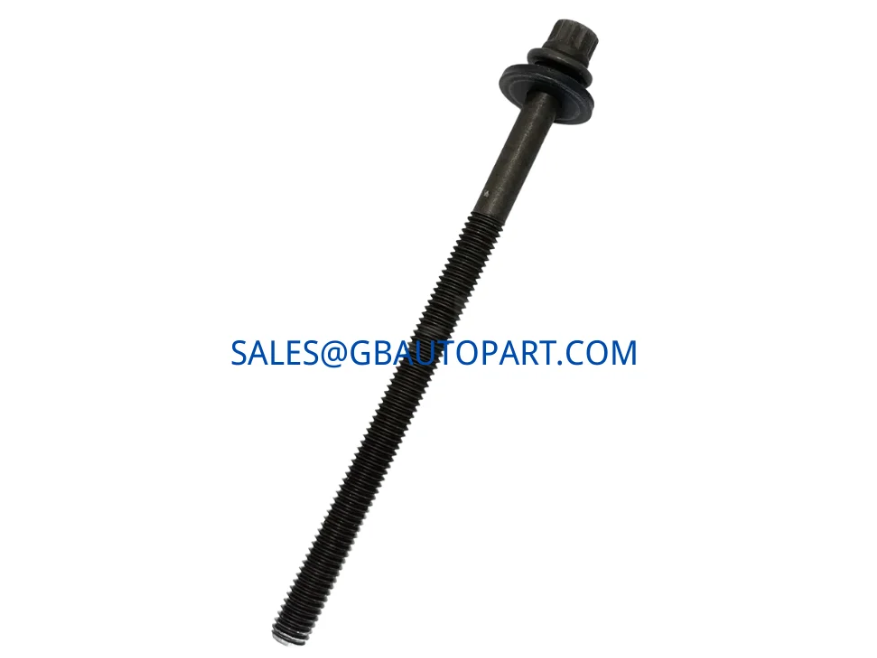
When you consider the health and performance of your vehicle, you probably think about the major components first: the engine, the transmission, the brakes. However, the truth is that a car’s overall efficiency and reliability are often determined by the function of smaller, more specialized components. One such part is the 22320-03500 engine part, a seemingly minor component with a major impact on how your vehicle runs. This comprehensive guide will delve into the critical role this part plays, how it contributes to everything from fuel economy to emissions control, and why its proper function is non-negotiable for anyone who values a smooth and efficient driving experience.
The 22320-03500 engine part is a highly specialized sensor that is integral to the modern engine’s sophisticated control system. Specifically, it functions as the Intake Manifold Pressure Sensor (IMPS) on a range of vehicles. This sensor is strategically positioned to measure the absolute pressure within the engine’s intake manifold. By providing this crucial data to the Engine Control Unit (ECU), the 22320-03500 part becomes the eyes and ears of your engine’s brain, allowing it to make real-time adjustments that directly influence performance. It is a fundamental piece of the puzzle, and a fault in this single component can trigger a cascade of issues that compromise your vehicle’s entire operational integrity.
The Critical Role of 22320-03500 in Vehicle Performance

The significance of the 22320-03500 part extends far beyond simply taking a pressure reading. Its data is used by the ECU for a wide variety of calculations and decisions, each one vital to the health and efficiency of your engine. Therefore, understanding its multifaceted role is key to appreciating its value.
Optimizing Fuel Efficiency and Combustion
At the heart of the 22320-03500 part’s importance is its influence on the air-fuel mixture. A modern engine runs on a precise balance of air and fuel. Too much fuel results in a rich mixture, leading to poor fuel economy and increased emissions. Conversely, a lean mixture (too much air) can cause engine misfires, rough operation, and even long-term damage.
The 22320-03500 sensor provides the ECU with precise intake manifold pressure readings. The ECU then uses this data, along with information from other sensors, to calculate the exact amount of air entering the engine. This allows it to precisely control the fuel injectors, ensuring the perfect stoichiometric air-fuel ratio is maintained for optimal combustion under all driving conditions. As a result, your engine burns fuel more efficiently, translating directly into better gas mileage and a more economical ride. This intricate process is a testament to how seemingly small parts can have a huge impact on your wallet and your vehicle’s overall performance.
Ensuring Smooth Engine Operation
Engine problems such as rough idling, stalling, or hesitation during acceleration can often be traced back to a faulty sensor. When the 22320-03500 part fails to provide accurate data, the ECU loses its ability to make the necessary air-fuel adjustments. This can lead to a number of frustrating and potentially dangerous operational issues.
For example, during idle, the engine requires a very specific air-fuel mixture to maintain a steady RPM. If the sensor is sending incorrect pressure readings, the ECU may not be able to deliver the right amount of fuel, causing the engine to stumble or stall. Similarly, during acceleration, the rapid change in intake pressure needs to be communicated instantly to the ECU. An accurate reading from the 22320-03500 sensor allows the ECU to enrich the fuel mixture immediately, preventing a moment of hesitation or “flat spot” as you press the accelerator. Essentially, this component acts as a translator, ensuring your engine’s brain understands what your foot is asking it to do.
Controlling Emissions and Promoting Environmental Responsibility
In today’s world, a vehicle’s environmental footprint is a major concern. The 22320-03500 engine part plays a silent but crucial role in meeting strict emissions standards. By maintaining the ideal air-fuel ratio, it ensures that combustion is as complete as possible. Incomplete combustion is a primary source of harmful pollutants like hydrocarbons (unburned fuel), carbon monoxide (CO), and nitrogen oxides (NOx).
By providing the precise data needed for efficient combustion, the 22320-03500 sensor helps reduce these pollutants before they ever leave the tailpipe. A properly functioning sensor is a prerequisite for your vehicle’s catalytic converter and other emissions systems to work effectively. Therefore, maintaining this part isn’t just about vehicle performance; it’s also about fulfilling your responsibility as a driver to minimize your impact on the environment.
Enhancing Engine Longevity and Reliability
A well-oiled machine is a reliable machine. When the air-fuel mixture is consistently incorrect due to a failing 22320-03500 part, it places unnecessary stress on the engine’s internal components. A lean mixture can cause cylinder temperatures to rise, leading to premature wear and potential damage to pistons and valves. A rich mixture can lead to carbon buildup on spark plugs and other components, which can reduce efficiency and lead to costly repairs down the road.
By ensuring the ECU receives the correct data, the 22320-03500 sensor helps protect your engine from these risks. It promotes smooth, reliable operation and safeguards the intricate moving parts from the damaging effects of an imbalanced air-fuel ratio. In this sense, it is an investment in your engine’s long-term health, helping to avoid expensive repairs and extend the life of your vehicle.
Recognizing the Signs of a Failing 22320-03500 Engine Part
Because the 22320-03500 part is so critical, its failure can be easy to spot if you know what to look for. Recognizing these symptoms early can save you from more extensive engine problems.
Check Engine Light Illumination
The most common and immediate sign of a problem with the 22320-03500 sensor is the illumination of your car’s Check Engine Light (CEL). When the ECU detects a pressure reading that is outside of its expected range, it will register a fault code and turn on the light. This is your vehicle’s way of telling you that something is wrong and needs attention. While a Check Engine Light can indicate countless issues, a specialized diagnostic scanner can confirm if the fault is related to the Intake Manifold Pressure Sensor.
Poor Fuel Economy
A gradual but noticeable drop in your vehicle’s fuel efficiency is a strong indicator of a failing 22320-03500 part. As the sensor provides incorrect data, the ECU may constantly over-fuel the engine to compensate, resulting in a rich air-fuel mixture. This condition, known as running rich, means you are burning more fuel than necessary for the amount of power being produced. Keep track of your fuel mileage; if you find yourself filling up more often, this sensor could be the culprit.
Rough Idling or Stalling
When a 22320-03500 sensor malfunctions, it often leads to erratic engine behavior at idle. The engine may shake, fluctuate in RPMs, or feel like it’s about to stall. This is because the ECU is receiving bad data and is unable to maintain the delicate air-fuel balance required for stable operation. In more severe cases, the engine might stall completely when you come to a stop, which can be both inconvenient and dangerous.
Hesitation During Acceleration
Another common symptom is a noticeable lag or hesitation when you press the gas pedal. This happens because the 22320-03500 part is not accurately measuring the increase in intake pressure that accompanies acceleration. Consequently, the ECU fails to provide the necessary fuel enrichment, causing a momentary lack of power or a “stumble” before the engine catches up.
The Importance of Choosing a Quality 22320-03500 Part
When it’s time to replace a failing sensor, the temptation may be to opt for the cheapest option available. However, this is a decision that can cost you far more in the long run. The precision and accuracy of this part are not areas to compromise on.
The Dangers of Subpar Parts
Aftermarket or counterfeit 22320-03500 sensors may be produced with lower-quality materials and without the strict quality control of a reputable manufacturer. These parts can provide inaccurate readings from the start, or fail prematurely under the constant heat and vibration of the engine bay. A cheap replacement can lead to ongoing performance issues, the return of the Check Engine Light, and even potential damage to other engine components as the incorrect air-fuel mixture continues to affect the engine. Ultimately, a low-quality part will require a second replacement much sooner, erasing any initial cost savings.
The Value of Reputable Brands
Choosing a 22320-03500 sensor from a trusted, high-quality brand ensures that the part has been engineered and tested to meet or exceed OEM specifications. These sensors are built for precision, durability, and a perfect fit. They will provide the ECU with the accurate, reliable data it needs, restoring your vehicle’s performance and efficiency and providing peace of mind. Investing in a quality part is not just a repair; it’s a commitment to your vehicle’s long-term health and reliability.
Frequently Asked Questions (FAQ)
What is the typical lifespan of a 22320-03500 sensor?
The lifespan of an Intake Manifold Pressure Sensor can vary widely depending on driving conditions, environmental factors, and the part’s quality. While many can last for the life of the vehicle, others may fail much sooner due to exposure to heat, moisture, or vibrations. It is generally not a part with a set replacement interval, but it should be replaced immediately if it shows signs of failure.
Can I replace the 22320-03500 part myself?
While the replacement of the 22320-03500 part is generally straightforward, it’s recommended to have a professional mechanic perform the diagnosis and installation. A mechanic has the proper diagnostic tools to confirm that the sensor is indeed the source of the problem. Additionally, they can ensure the new part is installed correctly and that any related fault codes are cleared from the ECU.
Why is my Check Engine Light still on after I replaced the part?
If the Check Engine Light remains on after you have replaced the 22320-03500 sensor, it could be for a few reasons. The most common cause is that the ECU’s fault code was not cleared. A diagnostic scanner is required to reset the light. If the light comes on again, it may indicate a separate, underlying issue that was also contributing to the symptoms, or that the new part is faulty. A professional diagnosis is always recommended.






